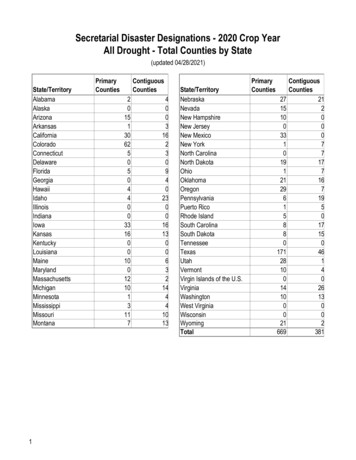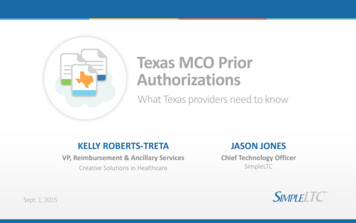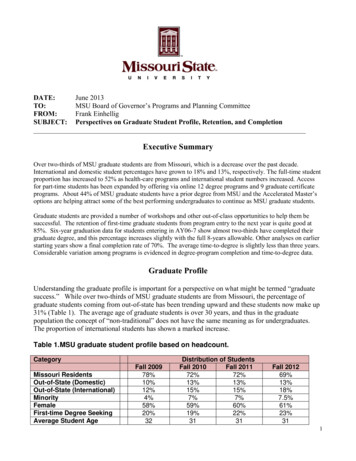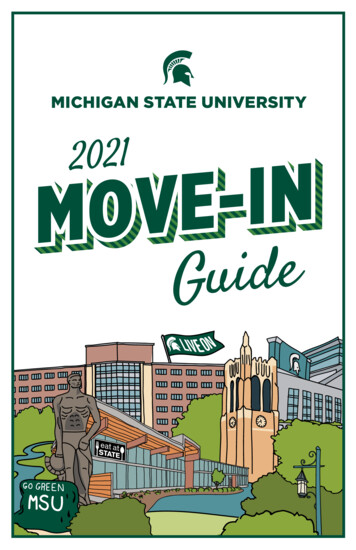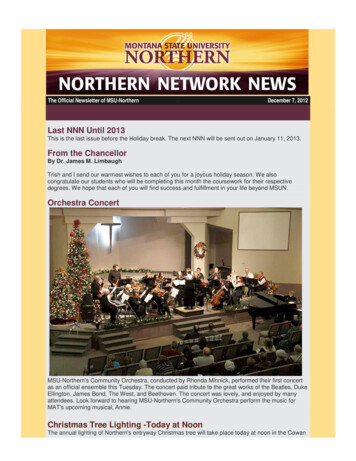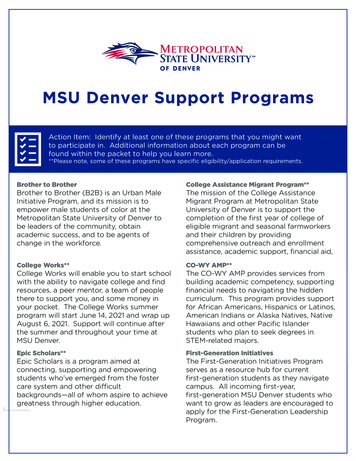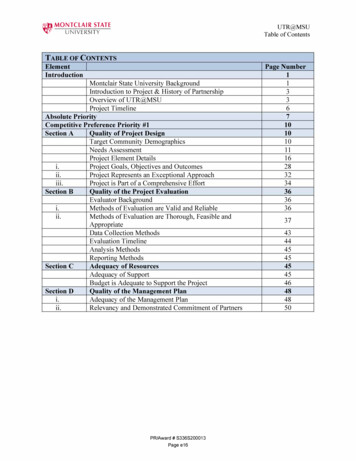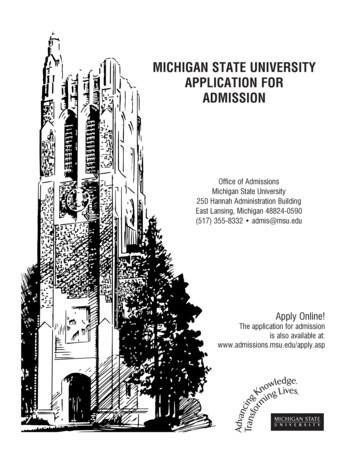
Transcription
Information Security HandbookDepartment of Information TechnologyMidwestern State UniversityRevised: May 2018
FOREWORDThe information age has changed our lives in ways that we can all feel: how we communicate, how we work, howwe research, how we navigate our world, using extremely powerful information retrieval devices that in manycases fit right in the palms of our hands.No longer is data processed or housed only on large central machines with access only by directly wiredspecialized systems. Access to information today is worldwide and instantaneous. Along with this new level ofaccess and mobility come new challenges for organizations such as Midwestern State University. Never beforehas there been a time when our organizational data has been so available and at the same time so vulnerable toloss or public exposure. The threats facing our University today are many and their scope is breathtaking.This handbook is written to help guide your understanding of organizational requirements for securinginformation in your individual areas and to serve as a ready reference for day-to-day operation of MidwesternState University information resources.Each one of us acts as a human firewall. Our defenses against outside and inside threats to information privacyand our operating environment are only as good as our individual best efforts.The artist and poet, Khalil Gibran, wrote:“If you reveal your secrets to the wind, you should not blame the wind for revealing them to the trees.”Never have Mr. Gibran’s sentiments been more apropos than in today’s information security environment.Jim HallChief Information Security OfficerDepartment of Information TechnologyMidwestern State UniversityMidwestern State UniversityInformation Security HandbookPage 2
Table of ContentsI.Introduction and Overview of the MSU Information Security Handbook .4II. Addressing Security within the University Community.4General User Access .4Password Guidelines .4Authentication of Users .5User Access to University Resources .5Network Access .6Handling of Sensitive/Confidential Information.7III. Acceptable Use of University Resources.7Security Awareness Training .8Network Access Accounts .8Banner INB Access Accounts .9Departmentally Managed Accounts.9Vendor Accounts .9Guest Accounts .9Assignment/Use of University Equipment.10Midwestern State University E-mail .10Authorized Software .11Authorized Computer Lab Software .12Physical Access .13Remote Access (VPN) .13Wireless Computing .14Media Sanitization and Disposal .14Malicious Code Protection .15Systems and Services Acquisition.16IV. Other Issues.17Malicious Code and E-mail .17V. Security within the University’s Computing Environment .17Requirements for Midwestern State University Servers .17Backup and Recovery .19Server Hardening.19Incident Management.19Network Configuration.20VI. Laws and Resources Concerning Security – University, State, and Federal.21Appendix A - Definitions .22Appendix B - Information Technology/Information Security Contacts .26Appendix C - Creating Strong Passwords .27Appendix D - Forms .29Appendix E - Personally Identifiable Information (PII) .30Modification Log.31Midwestern State UniversityInformation Security HandbookPage 3
I.Introduction and Overview of the Midwestern State University Information Security HandbookThe Midwestern State University (MSU) Information Security Handbook is written under the authoritygranted to the Chief Information Security Officer by MSU policy 4.197 and contains computingguidelines for University faculty, staff, students, campus guests, and vendors. The primary designee ofthe University for all Information Technology (IT) security related issues is the Chief InformationSecurity Officer (CISO). Departments that work with faculty, staff, and student information whetherfinancial, medical, academic, or any other sensitive information must read this handbook to becomefamiliar with the guidelines listed within. This handbook also addresses Texas and federal laws such asTexas Administrative Code (TAC), Federal Education Rights and Privacy Act (FERPA), HealthInformation Portability and Accountability Act (HIPAA), Gramm-Leach-Bliley Act (GLBA), DigitalMillennium Copyright Act (DMCA), and copyright law infringement.II. Addressing Security Within the University CommunityMSU supports the responsible use of its information resources. The information contained in thishandbook is aligned with the requirements outlined in the Texas Administrative Code Title 1, Part 10,Chapter 202 , Subchapter C, entitled ‘Security Standards for Institutions of Higher Education’ andMSU’s “4.197 - Information Resources Use and Security Policy.”Information resources include, but are not limited to: Computers Servers Wired and wireless networks Computer-attached devices Network-attached devices Voice systems Cable systems Computer applications Digital signageGeneral User AccessThis section defines the security standards and responsibilities of all Users of Information Resourcesat the University. All individuals using MSU information resources are prohibited from using acomputer account for which they are not authorized, or obtaining a password for a computeraccount not assigned to them. It is the responsibility of all individuals (faculty, staff, students, andvendors) using MSU's information resources to protect the privacy of their account(s).Password GuidelinesUsers are responsible for the security of their passwords. Personal account information should notbe released to friends, relatives, roommates, etc. Faculty and staff may visit or call the IT help deskto request that a password be reset. After the initial password is reset by IT personnel, faculty,staff, and students are immediately required to change the password after the first time it is used toensure password confidentiality. All verification of personal information needed to complete apassword reset is carried out according to applicable state and federal laws.New or changed passwords must meet the following standards: Passwords should not be given by e-mail. A password given by phone will require the caller to provideinformation proving their identity.Midwestern State UniversityInformation Security HandbookPage 4
The network authentication system login requires complex passwords which must contain a characterfrom at least three (3) out of the following four (4) character sets: Capital letter (A-Z) Lowercase letter (a-z) Digit (0-9) Special characters (such as !, , #, %) Passwords must include a minimum of six (6) characters; longer is better. Passwords must not include any part of the username for which it allows access. All Users are required to change their network passwords at least once every 90 days, andpasswordhistories are automatically kept to ensure the passwords are not reused immediately.After a password is changed by an account holder, it cannot be changed again for 30 days. If any misuse of MSU’s information resources is found, it is to be reported immediately to theappropriate management personnel. Any employee found to have violated this procedure maybe subject to suspension of their MSU network and system access and/or disciplinaryactions.One of the most common security problems that Users encounter is unauthorized use of theircomputer accounts generally caused by sharing account credentials with others (i.e. other MSUemployees, family, friends, and sometimes phishers). Account and password sharing is prohibited inall circumstances unless a documented shared account must be used to complete a task. A user mustnever log in as anyone other than himself or herself, and should not allow anyone to log in with his orher network account. Passwords should never be shared, written down, or disclosed to anyone - noteven supervisors.Authentication of UsersIn order to use the University’s computing environment, Users receive a unique network account thatallows them to authenticate. Wherever possible campus systems should utilize IT managedauthentication services to provide access in order to allow for proper access logging.If a system cannot allow for the use of IT managed authentication services, an exception must begranted by the offices of the Chief Information Security Officer and the Chief Information Officer.The exception request must include plans for monitoring security logs for system access, patching,maintenance procedures, and revision frequency.User Access to University ResourcesA network account is provisioned for all MSU Users and is the account used to gain access toUniversity resources (desktop, e-mail, internet, etc.) All Users are given specific e-mail quotas. Userswill receive access to User and departmental file shares upon request. Contractors are given accesson a case-by-case basis and at the request of the hiring department and will not receive an MSU email address.Users must never give their network account login information to anyone and should never askanother User to share his or her login information with them.A User’s access to University resources will be terminated upon appropriate notificationand documentation.Midwestern State UniversityInformation Security HandbookPage 5
Network AccessThis section defines the responsibilities of all Users at the University with regard to network access.The owner or designated assignee of a computer that is attached to the MSU network is responsiblefor both the security of that computer system and for any intentional or unintentional activities fromor to the network connections. Owners or designated assignees are responsible for all networkactivity originating from their equipment, regardless of who generates it. Any network-intensiveapplication or defective computer that causes network overload shall be reviewed, and if necessary,steps shall be taken to protect other Users and the overall MSU network. This includes contacting theoffending party (if applicable) and disconnecting the defective computer system from the networkuntil the problem is resolved. If the condition is an imminent hazard to the MSU network or disruptsthe activities of others, the defective computer system or the subnet to which it is attached will bedisabled without notice. The operator of the defective computer system will not be allowed to reconnect to the network until they follow explicit instructions from IT or IT help desk staff for securingthe machine.Non MSU-owned hardware must never be connected to the MSU wired network.It is the responsibility of every person using MSU's information resources to refrain from engaging inany act that may seriously compromise, damage, or disrupt the MSU network. This includes, but is notlimited to, tampering with components of a local area network (LAN) or the backbone, blockingcommunication lines, interfering with the operational readiness of a computer, creating/operatingunsanctioned servers or personal Web servers or File Transfer Protocol (FTP) sites, oraccessing/delivering unsanctioned streaming audio, video, or high bandwidth content such as gaming,music sharing, or non-University sanctioned video conferencing.The content of any files or services made available to others over the network is the sole responsibilityof the User with ownership of and/or administrative authority over the computer providing theservice. It is this User's responsibility to be aware of all applicable federal (FERPA, HIPAA, GLBA,DMCA) and state laws, as well as MSU policies. The User shall be liable for any violations of these lawsand policies.Network/internet connections used to share copyrighted materials (files, programs, songs,videos/movies, etc.) without permission of the copyright owner(s) violate the Digital MillenniumCopyright Act (DMCA). When informed by the copyright holder of a potential copyright violation, theUniversity is required by federal law to remove the copyrighted materials from the system in question.If MSU is unable to remove these materials for any reason, network access for the system in questionwill be terminated until the removal of the infringed materials is verified.Users should refrain from using an Internet Protocol (IP) address not automatically assigned to themand should not attempt to create unauthorized network connections or unauthorized extensions, orre-transmission of any computer or network services.If any misuse of MSU’s network resources is found, it is to be reported immediately to theappropriate management personnel and may be subject to criminal prosecution.Handling of Sensitive/Confidential InformationMSU personnel who deal with sensitive and/or confidential information concerning students andemployees must be cognizant of their responsibilities concerning that information and exercise duecaution when dealing with confidential or sensitive information. Measures should be taken againstMidwestern State UniversityInformation Security HandbookPage 6
disclosing information to unauthorized employees, contractors, vendors, parents, etc.Sensitive/confidential information typically falls under the provisions of laws and regulations thatimpose security requirements designed to prevent unauthorized access to those records. Examplesof such laws are the Health Information Portability and Accountability Act (HIPAA), which regulatesaccess to Protected Health Information, and the Gramm-Leach-Bliley Act (GLBA), which regulatesaccess to non-public financial information about a University customer or employee, and FamilyEducational Rights and Privacy Act (FERPA), a law that protects the privacy of student educationrecords.In order to properly secure information: Privacy screens are recommended for any computer that displays sensitive or confidentialinformation and is used in public areas Workstations must be locked when left unattended for any length of time Workstations should be required to have a password to regain access when the workstation goesinto sleep mode Confidential or sensitive printed information should not be left in plain view, should be securedwhen not in use (locked file cabinet, desk), and locked away after business hours Disposal of electronic as well as paper records is subject to the retention requirements set upby the State of Texas and the MSU records retention officer Should paper records need to be destroyed, the information should be shredded beforediscarding Disposal of MSU electronic media must be completed per the Media Sanitization and Disposalsection of this handbook.Example of confidential/sensitive information includes but is not limited to: Passwords Social Security Numbers Performance reviews Most student information including schedules, grades, and student payrollinformation Confidential memos Medical information Credit card numbers Employee payroll information Budgetary/financial informationAny abuse or disclosure of confidential or sensitive information whether accidental or deliberate, mustbe reported immediately to the appropriate management personnel.III. Acceptable Use of University Information ResourcesThe purpose of this section is to outline guidance, rules, and acceptable practices for the use ofinformation resources at MSU. All Users of the University’s computing environment are alsoresponsible for adherence to any State or Federal regulations regarding computer use at theUniversity. This applies to all Users of the MSU wired network, wireless network, web services, e-mail,and computing resources, including any and all technical systems and services provided or owned bythe University. Access to computing resources at the University is a privilege, not a right, and isgranted with restrictions, responsibilities, and proper documentation for use.Midwestern State UniversityInformation Security HandbookPage 7
MSU reserves the right to limit, restrict, or extend privileges and access to its resources.Security Awareness TrainingUnderstanding the importance of information security and individual responsibilities and accountabilitypertaining to information security are paramount to achieving organizational security goals. This can beaccomplished with a combination of general information security awareness training and targetedfunction-specific training. All MSU personnel who use information resources are required to participate inannual security awareness training.New employees are required to complete security awareness training prior to, or at least within 30 daysof employment. No access to systems containing confidential information will be granted until traininghas been completed.Annual security awareness training for all employees will be made available on August 1st of each year andmust be completed by April 30th of the following year. Accounts for Users not completing the securityawareness training program will be disabled.MSU makes this training available on the web and it can be accessed by the Security Awareness Traininglink provided here.All Users must acknowledge they have read, understand, and will comply with University requirementsregarding computer security policies and procedures as part of the annual Security Awareness Trainingprogram.Network Access AccountsAll new employees at MSU are given specific information on getting and protecting their Useraccounts either during or prior to new employee orientation. In addition, they are required to signthe “Information Resources Use and Security Policy Agreement”, which outlines their duties andresponsibilities with all University information. Users are responsible for all activity performed withtheir MSU network access account.All accounts may be disabled, revoked, or deleted if account privileges are no longer commensurate withan individual’s function at the University or their need-to-know due to changes in their status.All accounts may be disabled, revoked, or deleted if it is determined the account has beencompromised or misused.Disabled, revoked, or deleted accounts may be reinstated at the direction of the Chief InformationOfficer or Chief Information Security Officer.Under normal circumstances, accounts will persist under the following schedule: Student Accounts – 13 months after the student is no longer associated with MSU Employee (Faculty/Staff) Accounts – account will be disabled based on the separationdate listed in the terminating EPAF in Banner or upon dismissal Consultant/Support Accounts - Until the account is no longer needed Emeritus Retiree Accounts - Until the account is no longer needed; Banner INB access willbe disabled on the separation date listed in the terminating EPAF in Banner.Midwestern State UniversityInformation Security HandbookPage 8
If a User has problems with a network account, he or she can contact the MSU help desk by calling(940) 397-4278.Banner INB Access AccountsAll employees requiring access to business functions and data hosted in the Banner system are grantedInternet Native Banner (INB) access based on approval of the data owner of the system for which accesshas been requested. Banner systems and the appropriate data owners are listed below:SystemBanner StudentBanner Financial AidBanner Human ResourcesBanner FinanceData OwnerRegistrar (msuregistrar@mwsu.edu)Director of Admissions (msudirectorofadmissions@mwsu.edu)Director of Financial Aid (msudirectoroffinancialaid@mwsu.edu)Director of Human Resources (msudirectorofhumanresources@mwsu.edu)Director of Payroll (msudirectorofpayroll@mwsu.edu)Controller (msucontroller@mwsu.edu)Requests for INB access are to be made directly to the data owner. Once the data owner has determinedwhat access should be granted for a specific new User, he or she will send an e-mail tohelpdesk@mwsu.edu with the requested account creations and/or permission changes. The Help DeskAnalyst will then: verify the identity and employment information for the User being given access, complete the requested account creations and/or permission changes, notify the User of any User name and/or password changes, and notify the data owner that the request has been completedINB access will not be granted until a User has completed security awareness training.Departmentally Managed AccountsFor access to sensitive information managed by a department, account management should comply withthe standards outlined above. In addition, naming conventions must not cause contention with centrallymanaged e-mail addresses or usernames. Should the potential for contention arise, the applicablesystem(s) should not be connected to the campus network until a mutually satisfactory arrangement isreached.Vendor AccountsEmployees of independent contractors and vendors needing accounts for access to MSU informationresources are required as well to sign the “Information Resources Use and Security Policy Agreement”before they are given access to any University information resources.Vendor accounts are monitored by IT and are granted least-privilege access to resources with adocumented requirement. All requests for vendor access must include an end date.Guest AccountsOfficial guests of the University can request an account for use at the University but are under thesame restrictions as those on a Vendor account (e.g., must sign agreement, limited secure access,expiration dates, etc.) and are required to have a University sponsor to gain access to the MSUMidwestern State UniversityInformation Security HandbookPage 9
network.Assignment/Use of University EquipmentAll MSU information resources equipment is tagged for inventory purposes and assigned either to anindividual or department by Information Technology in coordination with the owning department.All personnel requiring the use of individual workstations or assigned laptops are considered thecustodians of that equipment and as such are expected to follow University guidelines concerning thesecuring of that equipment and University data on the equipment.Equipment taken off campus (e.g., desktops, laptops, printers) require the custodian of thatequipment to sign a yearly Request to Remove Tracked Property From Campus Form stating wherethe equipment is to be housed.Personal information including iTunes music files, movies, photos, etc. shall not be placed on anyUniversity network shared resource and is subject to removal without notice. Incidental use of University information resources must not interfere with User’s performance of officialUniversity business, result in direct costs to the University, expose the University to unnecessary risks, orviolate applicable laws or other University policy. Users must understand that they have no expectation of privacy in any personal information stored by aUser on a University information resource, including University e-mail accounts. A User’s incidental personal use of information resources does not extend to the User’s family membersor others regardless of where the information resource is physically located. Incidental use to conduct or promote the User’s outside employment, including self-employment, isprohibited. Users may not be paid, or otherwise profit, from the use of any University-provided information resourceor from any output produced using it except in accordance with MSU Faculty Intellectual Property RightsPolicies 3.139 and 3.140. Users may not promote any commercial activity using University informationresources. Examples include attempting to sell football/basketball tickets or used textbooks or advertisinga "Make Money Fast" scheme via a newsgroup. Such promotions are considered unsolicited commercialspam and may be illegal as well. Incidental use for purposes of political lobbying or campaigning is prohibited. Storage of any e-mail messages, voice messages, files, or documents created as incidental use by a Usermust be nominal.Any abuse or theft of University equipment whether accidental or deliberate, should bereported immediately to appropriate management personnel.Midwestern State University E-mailThis section defines the responsibilities of all Users at the University with regard to e-mail.E-mail accounts are only created after proper documentation has been supplied to the University. Anyperson using e-mail should not send excessive e-mail, attachments, or messages locally or over thenetwork. As a general guideline when sending out an e-mail to a large audience, the e-mail messagesshould be of sufficient general value that it would justify being sent as a memorandum if e-mail werenot available. Campus-wide e-mail discussions should use a Listserv (automated mail subscriptionMidwestern State UniversityInformation Security HandbookPage 10
service) when possible. The IT department can make these available on request for faculty and staffwith proper authorization from supervisors of that department.Electronic mailboxes are not deemed to be private and are subject to review by managementpersonnel after appropriate management approval is first obtained. All inbound and outbound emails are archived centrally in line with the e-discovery guidelines in the Federal Rules of CivilProcedure.No User of MSU e-mail may take any of the following actions: Send an e-mail under another individual’s name or e-mail address, except whenauthorized to do so by the owner of the e-mail account for a work related purpose Send or forward an e-mail through a MSU system or network for any purpose if suche-mail transmission violates laws, regulations or University policies and procedures Use any e-mail system other than an approved MSU e-mail system to conductUniversity business or to represent oneself or one’s business on behalf of theUniversity. Examples of e-mail systems that are not approved include a personal email ( i.e. username@gmail.com ) account or a personal MSU alumni account ( i.e.username@alumni.mwsu.edu ) Send nuisance e-mail or other online messages such as chain letters Send obscene or harassing messages Send unsolicited e-mail messages to a large number of Users unless explicitlyapproved by the appropriate U
granted to the Chief Information Security Officer by MSU policy 4.197 and contains computing guidelines for University faculty, staff, students, campus guests, and vendors . The primary designee of the University for all Information Technology (IT) security related issues is the Chief I nformation Security Officer (CISO).
